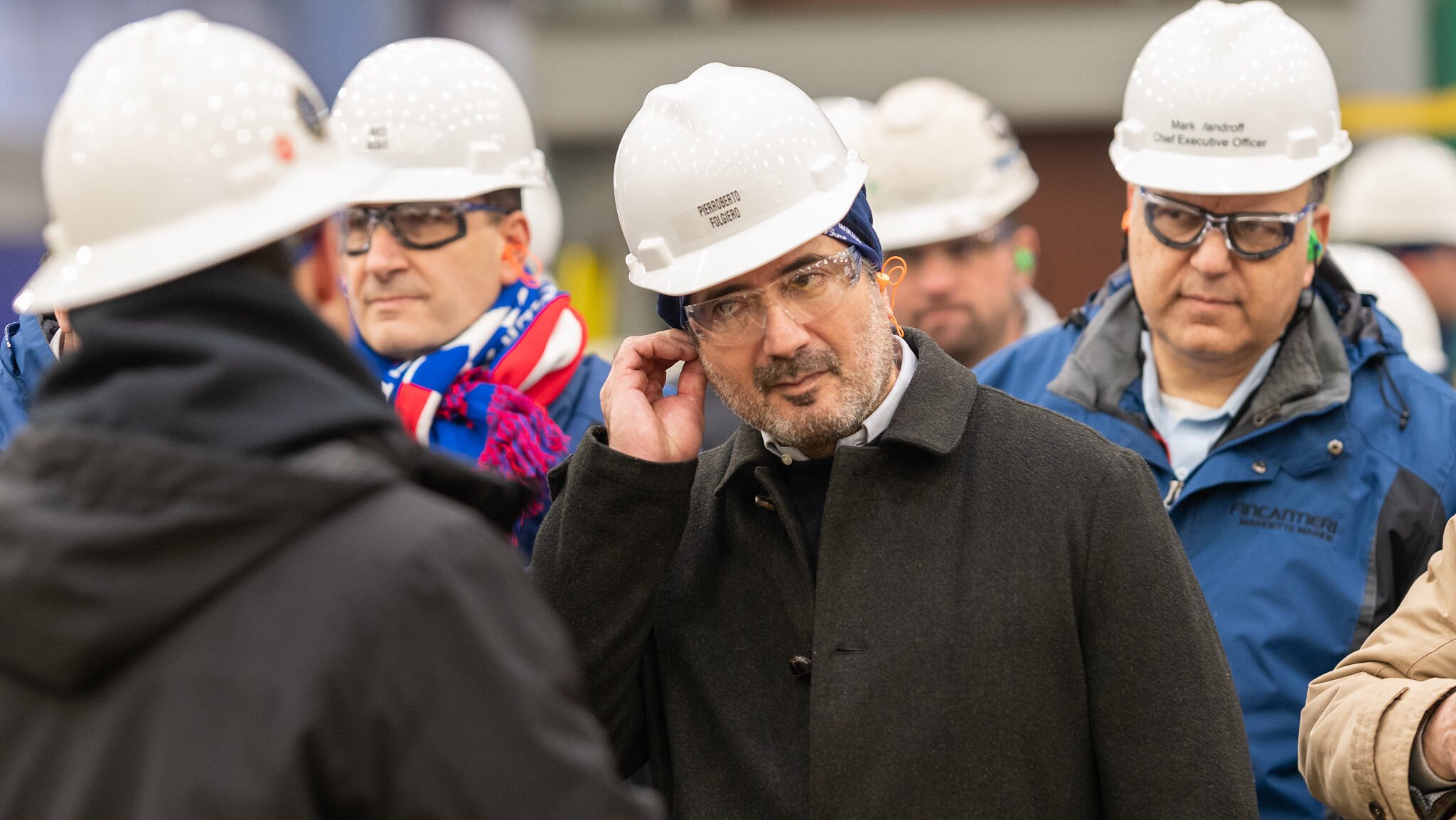
Pierroberto Folgiero (c), CEO of Fincantieri, visits the company’s Marinette shipyard. (Fincantieri)
WASHINGTON — Italian ship-making giant Fincantieri believes the future is underwater — and is working to position itself to take advantage of both the defense and commercial markets that will emerge.
“Underwater will be what space was 40 years ago,” company CEO Pierroberto Folgiero told Breaking Defense during a recent visit to Washington — meaning that while it is in the relatively early days, there will be a big boost for dual-use technologies, a development Fincantieri wants to get ahead of.
In the big picture, he said, the company views the undersea market as worth up to $400 billion by 2030. A quarter of that, he predicted, will come from defense, which he described as the “short-term” market. Medium-term is the oil, gas and energy market, which he predicted would be larger than the military market. And down the road, the company sees a growth market in aquaculture.
“We are very serious about growing underwater capabilities because we believe that our country [Italy] will have to take care of the Mediterranean Sea,” he said. In the waters around Italy, he noted, “there will be more and more congestion … for immigration, for Russian submarines, for cables, for sea beds, for mining of sea beds.”
A lot of the same technologies that would be used for the oil and gas industry could also have defense applications. For instance, Folgiero said the firm is “focused” on developing a “mothership” concept specifically for underwater operations. That platform would work with remote operated vehicles, which would be useful for the oil and gas industry — or for demining a body of water.
That the Italian firm has a history of both defense and commercial shipbuilding positions it well to move in that direction, but the easiest way to gain traction might be mergers and acquisitions. Recent reports stated that Fincantieri is looking to buy Leonardo’s Whitehead Alenia Sistemi Subacquei (Wass) submarine unit.
Asked about those reports, Folgiero avoided specifics but acknowledged the company was looking around.
“What I can confirm is that we are pursuing a strategy for the growth, organic and inorganic, of our underwater business, starting from submarines, moving to drones, moving to the other technologies of the underwater. So the strategy is there,” he said. “How we move, what we consolidate, under which conditions at which prices with which financial structure, it’s delicate to disclose.”
The firm is also looking at potential partnerships, noting Fincantieri is “creating alliances with other players of the underwater domain in our region.” That includes new ties with telecom providers to understand what their needs are — another area where commercial and defense interests would align.
More broadly, Folgiero said the firm remains focused on expanding in both the Middle East and Southeast Asia.
In the Middle East, the company in February announced a new partnership with EDGE Group, the national champion of the United Arab Emirates. Under the agreement, of which EDGE holds 51 percent, the Emirati firm will take lead on sales for non-NATO nations. Beyond the Gulf, for Fincantieri the relationship with Abu Dhabi serves as a “door” into sub-Saharan Africa that should open up markets, Folgiero said.
In Asia, the needs are different, Folgiero said, noting the kind of joint venture formed with EDGE wouldn’t make sense in that region. However, the desire for localization will still be strong, a potentially complicated condition but one the executive said his firm is well versed in given its global footprint.
Notably, the company on March 28 signed a €1.18 billion ($1.27 billion) with Indonesia to supply two Multipurpose Offshore Patrol Vessels.
Justin Katz contributed to this report.























